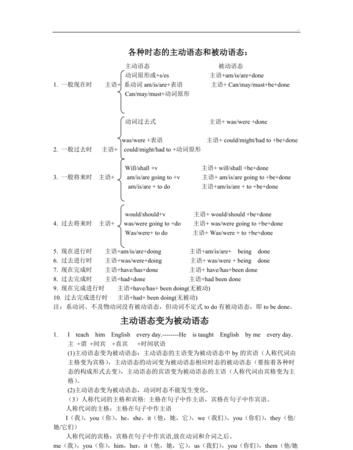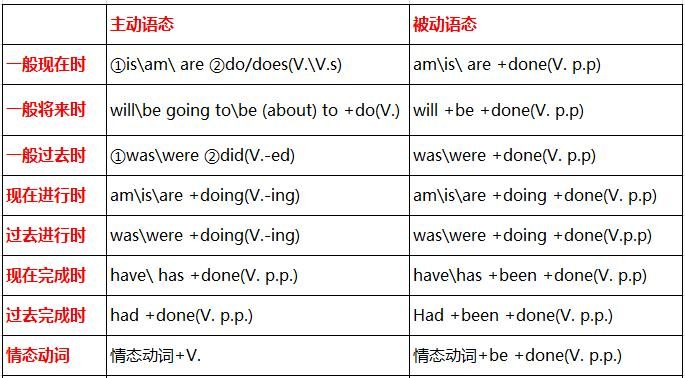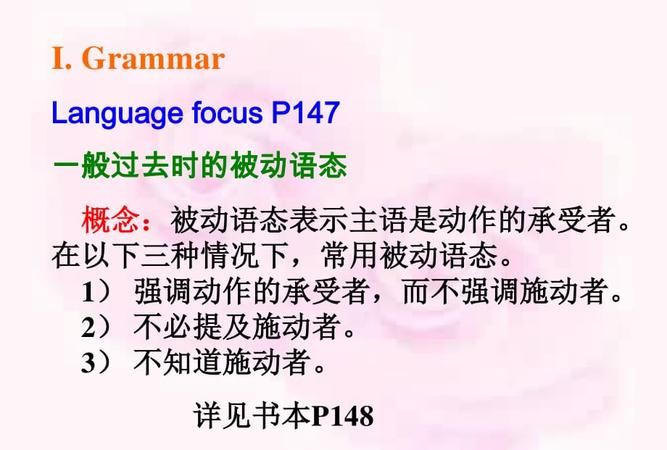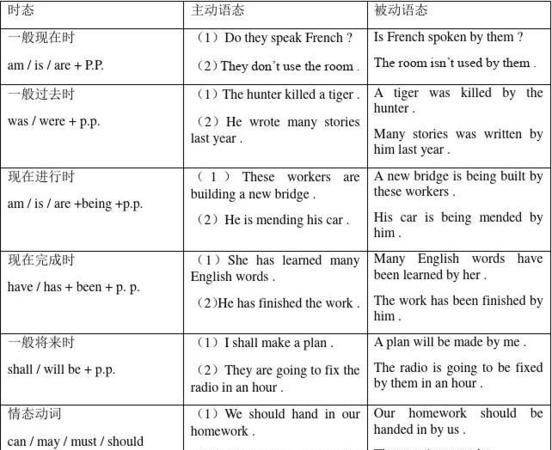本文目录
被动语态的用法和例句
被动语态是动词的一种形式,用以说明主语与谓语动词之间的关系。
被动语态用法
① 不知道谁是动作的执行者(即不知道谁做)时用被动语态,省略by短语。如:A man was killed in the accident.(一个人死于事故)/ This window was broken yesterday.(这扇窗子是昨天被打破的)
②不说或者众所周知是谁做时,用被动语态,省略by短语。如:Rice is also grown in this place.(这个地方也种水稻)/ A railroad will be built here in three years.(三年之后这里将要修建一条铁路)
③强调动作的承受者,句尾加by短语。如:It was written by Lu Xun.(它(书)是鲁迅写的)/ A pet dog is never killed by its owner.(宠物狗是不会被主人宰杀的)
被动形式表示主动意义
被动形式表示主动意义主要有下面两个考点需要同学们注意:
1)一些固定词组,它们的被动形式通常表示主动意义。
例如be concerned with/ about(关心),be dressed in(穿着). be hidden(躲藏起来),be located(位于),be lost in(陷入,迷路),be seated(就座)等。大家看下面例句:
That’s fine,as far as we’re concerned. 就我们而言,那样挺好。
After everyone was seated,the teacher began to read the result.
同学们就座后,老师开始读考试结果。
2)还有一些动词构成的被动形式也表示主动意义。
这类词组有: be used to(习惯于),be born(出生),be determined(决心,决定),be prepared(准备)等。
被动语态例句
1The floor was swept.地板打扫了。
2The letter was written by him.这封信是他写的。
3The glass was broken by the boy.杯子被那个男孩打破了。
4English is spoken by many people in the world.
世界上许多人说英语。
5Knives are used for cutting things.
刀用来切东西。
以上就是我整理的被动语态用法,感谢阅读。

英语中被动语态的判别.构成.常用词组
被动语态
英语中时态很多,但语态不多,只有两种,即:主动语态和被动语态。今天我们着重讲被动语态。
1. 定义:被动语态,即不知道动作执行者或强调动作承受者的一种语态。例如中文常说:我被他打,这就是一种被动。但有时由于句子结构上的需要也要用被动,例如It is not unusual for workers in that region to be paid more than a month it 在句中作形式主语。而不定式to be paid more than a month是句子的逻辑主语。结合选项全句的意思是:“那个地方的工人一个多月后才得到工资是常有的事”。
2. 构成:be+past participle(过去分词)(简称P.P.)(+by+动作执行者)(过去分词的概念见上课)
3. 当主动语态要被改成被动的时候,我们把原句的宾语提前,作为改句的主语,主语后置,作为宾语。因此有一点要注意,不及物动词由于不加宾语,没有被动形式,但不及物动词如果与某些介词构成介词短语,可以用被动。例如The fire had been put out before the fireman arrived. Put是不即物动词,但put out是及物动词
4. 应用到各种时态和句型如下:
① 一般式(一般现在,一般过去,一般将来):am, is, are, was, were, is going to be , will be+done.ie. Once environmental damage is done, it takes many years for the system to recover. 本句的意思是:“环境一旦遭到破坏,需要多年时间才能恢复过来。”do作为及物动词有“引起,产生”的含义,do damage的意思是“造成破坏”。主语damage是及物动词do的动作对象,谓语应当用被动语态。同样的,还有,I will mend the machine.相当于The machine will be mended (by me).
② 进行时(现在进行、过去进行、将来进行):be+being+P.P. ie.The classroom is being cleaned.
③ 完成时(现在完成、过去完成、将来完成):have/has been + P.P.:例如The machine will have been repaired by 3 o’clock this afternoon.再如:My homework has been finished.
④ 其他时态依词类推,可得到结果。
⑤ 情态动词的被动语态:主语 + 情态动词 + be动词 + 动词过去分词,例如Your teeth must be brushed.
⑥ 不定式的被动语态:to be done例:The no-shows have to be considered when deciding the rate of overbooking.(确定超过接待能力的预定时必须考虑预定了房间却来不了的客人。)
Ⅱ、主动语态变为被动的几个特殊情况
① 有些动词在主动结构中,后面接不带to的不定式,但如果改为被动,则需把省略的to加上,这类动词有hear, watch, make, help, let等,如:The boss made my grandfather work 10hours a day.改成My grandfather was made to work for 10 hours a day.
② 含有宾语从句的主动结构变为被动,通常用it作为被动结构的先行主语,从句放在句子后面/也可采用另一种形式,这类动词有:know, say, believe, find, think, report等
③ 是所有的主动句都可以变换成被动句,更不是所有的被动句都可以自由变换成主动句。虽然语法原则上允许主动和被动句的互相转换,但有的句子转换后会变成不通顺或不地道的英语句子。因此,在某些题目里,这也成为判断应该用主动还是用被动的依据。
例:At 5:05 p.m. on Saturday 19th July , there was an accident at the junction of the Main Street and Panda Road when a boy was knocked down off his bicycle by a delivery van. The boy was sent to St. Maria Hospital where he was treated for shock and a broken arm.
在这段文章里,a boy was knocked down off his bicycle by a delivery van这句被动句强调出读到文章的人最关心的事故的受害者。The boy was sent to St. Maria Hospital这句话则说明了孩子被送到医院的事实,至于是由谁(某个过路人?或肇事司机?)送的不重要。he was treated for shock and a broken arm这句被动句无须说出treat这个动作的发出者,因为在医院,伤病员自然由医务人员处理,无须罗嗦。这样,这段文章就重点突出,条理清楚了。
④ 有些动词可以有两个宾语,在用于被动结构时,可以把主动结构中的一个宾语变为主语,另一个宾语仍然保留在谓语后面。多是把间接宾语变为主语。这样句子自然些。直接宾语变为主语时,间接宾语要变为某个介词的宾语,介词to可以省略。如His father left him this house.改为This house was left (to) him by his father.
⑤ 有些动词虽为及物,但宾语并非是动作承受者,不能转换,这些动词有have, hold(容纳),suit, fit, lack, become(适合)contain, cost, last, mean, suffice(足够)等。
⑥ 当直接宾语为反身代词、相互代词或宾语前有指代主语的物主代词时不用被动,如I shook my head.我摇摇头。
⑦ 当宾语为同源宾语(与主句指同一人),动名词,动词不定式或一个从句时不用被动。如John enjoyed seeing the fil,.
⑧ 在一些固定说法中,有些名词和动词结合的固定说法,不能改We Chinese always keep our word.
⑨ 某些从不及物动词转化来的及物动词,直接宾语在表示动作的方式或效果时,这些动词在意思上起状语的作用,没有被动The girl kissed her boyfriend good night=The girl said good night to her boyfriend by kissing him.
⑩ 表地点\处所\组织\长度\大小\数量\程度\抽象名词的词做宾语时不用被动.
⑪ 某些“不及物动词+介词”短语,walk into, listen to, sleep in, agree with, shake hands with, belong to, take part in, keep up with不能用被动。
⑫ 某些词用主动表被动:sell, miss, build, grow, look, smell, taste, sound, feel等
英语|被动语态基础练习
1).Put the following sentences into the passive voice
1.People speak English in many countries.
2.We built this bridge last year.
3.The tiger in the z00 frightened the little girl.
4.Xiao Liu has invited you to a lunch party.
5.You must not take these magazines out of the reading-room.
6.We shall discuss the problem at tomorrow's meeting.
7.Has anybody fed the birds?
8.People will never forget the accident.
9.You may write this letter in pencil.
10.They are repairing the car in the garage.
11.Someone must have turned on the light without your notice.
12.They have found ways to make waste water clean.
13.Someone must take care of the children when we go out.
14.They won't hold the meeting until next Friday.
15.They gave him a medal for his wonderful work.
16.The doctor will ask the patient some questions before he gives her medicine.
17.They made the young man head of the volleyball team.
18.Someone will tell you how to prepare for the examination.
19.They criticized me for something wrong that I had done.
20.Someone has taken the stranger to another hospital.
21.It surprised me to hear that they wouldn't give him a holiday after his hard work.
22.People oughtn't to criticize her for this matter.
23.People will laugh at you if you wear that dress.
24.They ought to have told you how much money you needed.
25.I have told him that he didn't satisfy his examiner.
26.We must finish the work by six o'clock this afternoon.
27.Do you often clean your room?
28.They are making this type of radios in shanghai.
29.Could you carry out the plan on time?
30.We must pay attention to such problems.
31.Someone is showing them how to operate the computers.
32.You should put forward(提出)the questions at the meeting.
33.They used to practise speaking English together.
34.He is sure to finish the job by then.
35.She is going to play the match today.
36.People are talking about the incident all over the town.
37.We saw a bus running towards us at that time
38.They elected her leader of the group.
39.They had to put off the sports meet because of the rain.
40.We don't have to write it in such a hurry.
2).Make the best choice:
41.Our house_____,
A.is getting paint B.is getting painted
C.is got painted D.has got to paint
42.He arrived in Beijing,where he_____his friend.
A.was met by B.was met
C.was meeting D.met by
43.The war_____in 1937
A.was broken out B.had been broken out
C.has broken out D.broke out
44.The mistakes in the exercises will_____the teacher.
A.cross B.be crossing
C.be crossed by D.cross by
45.My brother and I have __________her birthday party.
A.been invited B.been invited for
C.invited to D.been invited to
46.It_______this way
A.is had to do B.is had to be done
C.had to be done D.has to do
47.It__this way.
A used to do B.used to be done
C.is used to do D.is used to doing
48._____Chaplin.
A.The child's name was called
B.The child's name calls
C.The child calls
D.The child is named
49.The sports meeting____ .
A.is put off B.is to put off
C.is to be put off D.puts off
50.Mary realized she_________
A.was making fun of B.was made fun
C.was being made fun of D.was being made fun
51.______to say a thing in that way
A.It is considers wrong
B.It is considered wrong
C.It is considered it's wrong
D.It is consiedring wrong
52.He ordered that the books_______at once.
A.would be printed B.would print
C.be printed D.print
53.The story______in China.
A.was taken place B.was happened
C.took place D.has been taken place
54.The house_____my parents
A.is belong to B.belong to
C.belongs to D.is belonged to
55.He_______by his teacher.
A.happened to see
B.was happened to see
C.happened to be seen
D.was happened to be seen
56.Great changes_____in our province.Many tall buildings.
A.have been taken place, have been set up
B.have taken place, have been set up
C.have been taken place, have been set up
D.were taken place, were set up
57.The hall's____but it's not yet____with lamps.
A.furnished, finished
B.been finished, been furnished
C.being finished, being furnished
D.set up, full
58.The new hall is the tallest building in this town._____from here?
A.Can it see B.Can it be seen
C.Can it seen D.Can see
59.As soon as we got to the airport,we found that the plane_____.
A.had already taken off
B.already took off
C.was already taking off
D.was already taken off
60. Some of the hotels in my hometown_________.
A.have now been rebuilding
B.are now rebuilding
C.are now being rebuilt
D.are rebuilt now
(Answers to the questions: BADCD,CBDAC,BCCCC,BBBAC )

英语中被动语态的判别.构成.常用词组
不及物动词或动词短语无被动语态:
appear,
die
disappear,
end
(vi.
结束),
fail,
happen,
last,
lie,
remain,
sit,
spread,
stand
break
out,
come
true,
fall
asleep,
keep
silence,
lose
heart,
take
place.
2)
不能用于被动语态的及物动词或动词短语:
fit,
have,
hold,
marry,
own,
wish,
cost,
notice,
watch
agree
with,
arrive
at
/
in,
shake
hands
with,
succeed
in,
suffer
from,
happen
to,
take
part
in,
walk
into,
belong
to
3)
系动词无被动语态:
appear,
be
become,
fall,
feel,
get,
grow,
keep,
look,
remain,
seem,
smell,
sound,
stay,
taste,
turn
4)
带同源宾语的及物动词,反身代词,相互代词,不能用于被动语态:
die,
death,
dream,
live,
life
5)
当宾语是不定式时,很少用于被动语态。

英语被动语态语法归纳
初中英语的学习是日久天长不断积累的,那么如何积累才更有效,才更加的事半功倍,怎么样才能很好的学习英语呢?以下是我分享给大家的初中被动语态语法知识,希望可以帮到你!
初中被动语态语法知识
一、被动语态的构成形式
1. 被动语态的基本时态变化
被动语态通常为十种时态的被动形式, 被动语态由be +过去分词构成,be 随时态的变化而变化。以do 为例,各种时态的被动语态形式为:
1) am/is/are +done (过去分词) 一般现在时
例Visitors are requested not to touch the exhibits.
2) has /have been done 现在完成时
例All the preparations for the task have been completed, and we're ready to start.
3) am/is /are being done 现在进行时
例A new cinema is being built here.
4) was/were done 一般过去时
例I was given ten minutes to decide whether I should reject the offer.
5) had been done 过去完成时
例 By the end of last year, another new gymnasium had been completed in Beijing.
6) was/were being done 过去进行时
例A meeting was being held when I was there.
7) shall/will be done 一般将来时
例Hundreds of jobs will be lost if the factory closes.
8) should/would be done 过去将来时
例The news would be sent to the soldier's mother as soon as it arrived.
9) shall/will have been done 将来完成时(少用)
例The project will have been completed before July.
2. 被动语态的特殊结构形式
1) 带情态动词的被动结构。其形式为:情态动词+be +过去分词。
例The baby should be taken good care of by the baby-sitter.
2) 有些动词可以有两个宾语,在用于被动结构时,可以把主动结构中的一个宾语变为主语,另一宾语仍然保
留在谓语后面。通常变为主语的是间接宾语。
例His mother gave him a present for his birthday. 可改为 He was given a present by his mother
for his birthday.
3) 当“动词+宾语+宾语补足语”结构变为被动语态时,将宾语变为被动结构中的主语,其余不动。
例Someone caught the boy smoking a cigarette. 可改为The boy was caught smoking a cigarette.
4)在使役动词have, make, get以及感官动词see, watch, notice, hear, feel, observe等后面不定式作宾语补语时,在主动结构中不定式to 要省略,但变为被动结构时,要加to 。
例Someone saw a stranger walk into the building. 可改为A stranger was seen to walk into the building.
5) 有些相当于及物动词的动词词组,如“动词+介词”,“动词+副词”等,也可以用于被动结构,但要把它们看作一个整体,不能分开。其中的介词或副词也不能省略。
例The meeting is to be put off till Friday.
3. 非谓语动词的被动语态
v.+ing 形式及不定式 to do 也有被动语态(一般时态和完成时态) 。
例I don't like being laughed at in the public.
二、 如何使用被动语态
学习被动语态时,不仅要知道被动语态的各种语法结构,还要知道在哪些情况中使用被动语态。
1. 讲话者不知道动作的执行者或不必说出动作的执行者 (这时可省 by 短语) 。
例 My bike was stolen last night.
2. 借助被动的动作突出动作的执行者。
例 I was given ten minutes to decide whether I should accept the offer.
3. 为了更好地安排句子。
例The well-known person got on the bus and was immediately recognized by people. (一个主语就够了)
三、 It is said that+从句及其他类似句型
一些表示“据说”或“相信”的动词如believe, consider, expect, report, say, suppose, think等可以用于句型“It +be +过去分词+that 从句”或“主语+be +过去分词+to do sth.”。有:
It is said that„ 据说,It is reported that„据报道,It is believed that„大家相信,It is hoped that „大家希望,It is well known that„众所周知,It is thought that„大家认为,It is suggested that „据建议。
例It is said that the boy has passed the national exam. (=The boy is said to have passed the national exam. )
四、谓语动词的主动形式表示被动意义
1. 英语中有很多动词如 break,catch ,clean ,drive ,lock ,open ,sell ,read ,write ,wash 等,当它们被用作不及物动词来描述主语特征时,常用其主动形式 表达被动意义, 主语通常是物。
例 This kind of cloth washes well.
注意:主动语态表被动强调的是主语的特征,而被动语态则强调外界作用造成的影响。
试比较:The door won't lock. (指门本身有毛病)
The door won't be locked. (指不会有人来锁门, 指“门没有锁”是人的原因)
2. 表示“发生、进行”的不及物动词和短语,如:happen, last, take place, break out, come out, come about, come true, run out, give out, turn out等以主动形式表示被动意义。
例 How do the newspapers come out? 这些报纸是如何引出来的呢?
3. 系动词没有被动形式, 但有些表示感受、感官的连系动词feel, sound, taste, book, feel等在主系表结构中常以主动形式表示被动意义。
例Your reason sounds reasonable
五、非谓语动词的主动形式表被动意义
在某些句型中可用动名词和不定式的主动形式表被动意义 。
1. 在need ,want ,require, bear等词的后面,动名词用主动形式表示被动意义,其含义相当于动词不定式的被动形式。
例The house needs repairing(to be repaired).这房子需要修理。
2. 形容词worth 后面跟动名词的主动形式表示被动含义,但不能跟动词不定式;而worthy 后面跟动词不定式的被动形式。
例The picture-book is well worth reading.(=The picture-book is very worthy to be read.)
3. 动词不定式在名词后面作定语,不定式和名词之间有动宾关系时,又和句中另一名词或代词构成主谓关系, 不定式的主动形式表示被动含义。
例 I have a lot of things to do this afternoon. (to do与things 是动宾关系,与I 是主谓关系。) 试比较:I ’ll go to the post office. Do you have a letter to be posted? ( 此处用不定式的被动语态作定语表明you 不是post 动作的执行者。)
4. 在某些“形容词+不定式”做表语或宾语补足语的结构中,句子的主语或宾语又是动词不定式的逻辑宾语时,这时常用不定式的主动形式表达被动意义。这些形容词有nice ,easy ,fit ,hard ,difficult ,important ,impossible ,pleasant ,interesting 等。
例This problem is difficult to work out .(可看作to work out省略了for me).
5. 在too „ to„结构中,不定式前面可加逻辑主语,所以应用主动形式表示被动意义。
例This book is too expensive (for me) to buy.
6. 在there be„句型中,当动词不定式修饰名词作定语时,不定式用主动式作定语,重点在人,用被动形式作定语,重点在物。
例There is no time to lose(to be lost).(用 to lose可看成for us to lose;用to be lost,谁 lost time不明确。)
7. 在be to do结构中的一些不定式通常应用主动表主动, 被动表被动。然而, 由于古英语的影响, 下列动词rent,blame,let 等仍用不定式的主动形式表示被动意义。
例 Who is to blame for starting the fire?
六、介词in, on, under等+名词构成介词短语表被动意义
表示方位的介词与含动作意义的名词合用,含被动之义,其意义相当于该名词相应动词的被动形式,名词前一般不用冠词。
1. “under +名词”结构,表示“某事在进行中”。常见的有:under control(受控制), under
treatment (在治疗中), under repair(在修理中), under discussion(在讨论中), under construction(在施工中)。
例The building is under construction( is being constructed).
2.“beyond+名词”结构,“出乎„„胜过„„、范围、限度”。常见的有:beyond belief (令人难以置信) , beyond one’s reach(鞭长莫及),beyond one’s control(无法控制),beyond our hope. 我们的成功始料不及。
例The rumour is beyond belief(=can’t be believed).
3. “above+名词”结构, 表示“(品质、行为、能力等) 超过„„、高于„„”。
例His honest character is above all praise.=His honest character cannot be praised enough.
4.“for+名词”结构,表示 “适于„„、 为着„„”。如:for sale(出售), for rent(出租)等。 例That house is for sale. (= That house is to be sold).
5.“in+名词”结构 ,表示“在„„过程中或范围内”常见的有:in print(在印刷中),in sight(在视野范围内) ,等。
例The book is not yet in print.(=is not yet printed)
6.“on+名词”结构, 表示“在从事„„ 中”。常见的有:on sale(出售) ,on show(展出), on trial(受审)。
例Today some treasures are on show in the museum (= are being showed).
7.“out of+名词”结构 ; 表示 “超出„„ 之外“,常见的有:out of control (控制不了) ,out of sight (超出视线之外),out of one’s reach(够不着), out of fashion(不流行) 等。
例 The plane was out of control (can’t be controlled). 。
8.“within+名词”结构,“在„„内、不超过„„”。
例He took two days off within the teacher's permission
【题型展示】 A. be given B. has been given C. will be given D. will give
A . needn’t be thrown B . mustn’t be thrown
C . can’t throw D. may not throw A. is done B. will be done C. has done D. have done A. water B. is watering C. be watered D. waters
5. — I won’t come to the party unless — You mean if Sue comes you’ll come ?
A. will invite B. invites C. invited D. is invited A. rides B. is riding C. is ridden D. has ridden A. hear B. be heard C. be hearing D. have heard
8. — It’s time to do your homework , Jack .
— Yes , Mum . I’ll turn off the TV as soon as the programme A. ends B. end C. will be ended D. will end to the meeting , why didn’t you go ?
A. be invited B. will be invited C. were invited D. are invited A. planted B. are planted C. were planted
二. 用正确的时态和语态填空 (know )(build ). (see )(build )many years ago . (tell )break )last week . (tell )to take care of their desks and chairs . (be )hold )next Friday . turn )round the earth . use )(not use)it tomorrow .
(sell )in this shop . (speak )here . (like )by us all twenty years ago .
初中英语学习方法
一、把握好课堂学习这一主阵地。
课堂上要积极参与,不能做被动的听众。提高课堂效率,珍惜每一次练习机会。要想在课堂上提高效率,那课前的预习就显得尤为重要了。在预习时,我们要结合课后的notes(注释)熟读课文,了解生词在文章中的使用,标出难点。同时在课堂上要做到认真听讲,积极回答;我们还要学会记笔记,因为理解≠记住≠灵活运用。因此,对好的例句、词语辨析、常用句型、文化差异,中英文差异,习俗差异都可作些笔录。既可以在课上去记,同时课下还要进行认真的补充和整理,要将英语笔记作为我们学习英语的一笔宝贵的财富。
二、积极主动归纳总结语法规则
中学阶段的语法知识非常多,常常给人错综复杂的印象,记忆起来常常是“剪不断、理还乱”。其实语法记忆也有规律性,我们要形成一个完整的知识框架将语法点分类串起来。例如,由by引导的时间状语,主句大都跟完成时有关。by后接的是表示现在的时间,主句用现在完成时,而by后接的是表示过去的时间,主句用过去完成时。另外,语法记忆也讲究技巧性。比如,Negro,hero,tomato,potato这几个单词,它们有一个共性就是变成复数形式在词尾加-es。你可以把这几个词的中文意思串起来,“黑人和英雄爱吃番茄、土豆”,这样记就不容易遗忘了。因此在学习过程中,要善于主动观察、归纳、总结语法规则。
三、注重阅读训练,提高自己的阅读能力
阅读应该是高中三年中最应重视的部分了。因为它是培养英语语感,巩固和熟悉所学知识的最有效途径。在高中阶段,我们的阅读不能仅仅满足于课文了,还要做到进行大量的课外阅读。要记住,用一本教科书学英语是绝对不够的。泛读时可以选择一些与高中学习有关的书报杂志。读不同题材、体裁的文章,理解跨学科知识。读时注意对运用精妙的词汇,短语或句子做些摘抄。
四、要树立信心,不要妄自菲薄。
“有的同学在初中阶段英语学习的并不是很好,对高中学习也失去了信心。其实,语言学习就是一个积累的过程,只要我们在高中阶段认真学习,把握英语学习的规律,就一定能够将这一学科学好。无数的实践也反复证明了这一道理,很多在初中阶段英语基础并不是很好的同学,到了高中之后掌握了正确的学习方法并且努力学习,一样可以将英语学得很好。 记住:Rome isn’t built in one day! (罗马不是一天就建成的)。急于求成就可能会造成消化不良,或者一事无成的结果。急于求成往往表现为对自己提出过高的要求。这样做往往会给自己很大压力,进而对自己逐渐失去信心,失去兴趣。只有逐步的积累,才能聚沙成塔、集腋成裘,由量的积累进而实现质的变化,从而实现英语成绩的飞跃提升和自己语言运用能力的提高。
五、掌握英语语法的框架。
关于语法知识的学习:掌握一定的语法知识是必要的,它是基础,也是高中英语模块教学的重点。中国人学习外语应该学点语法,但是过分地研究语法是不利于能力的培养的,这也是中国人学习英语的误区。因此我们学习语法的时候,不是单纯的记忆语法的条文,而是看语法在实际语境中是如何应用的。语法会对其他能力的形成有很大的影响,缺乏的扎实的语法基础就无法读懂结构复杂的长句,阅读能力和书面表达的能力也因此而受到牵制和影响。切记:语言的意义决定语言的形式。我们在学习时一定要再具体的语境中去分析句子,认真分析并总结错题,我们就一定能够掌握好语法的。
初中英语学习建议
学习英语应注重能力的培养
英语对学生的听、说、读、写能力有了更高的要求,总的来说,英语应注重能力的培养,为以后运用英语进行交际及进一步自学深造打好坚实的基础。
在我看来,打好基础是学好英语的前提,如何打下基础呢?可以归纳如下:制定计划,明确目标;课前预习,找出难点;专心听讲,当堂巩固;及时复习,防止遗忘;独立作业,检测效果;错误归类,解决疑难;勤奋多练,广泛阅读;系统总结,掌握规律。
建立错误档案本
在学习过程中,已获得的知识和技能对以后新知识、新技能的形成产生一定的影响,最好的办法是消灭错误,获得正确知识和技能。每次练习或考试后,应该把自己做错的具有代表性的题目抄下来,收集汇编,然后把老师对错题讲解后的正确语句熟读牢记,保留错误的答案,用红笔写上正确的答案,眉批上理由分析,这样就形成新的语言习惯。平时和临考前翻看,加深印象,引起注意,大大减少了错误率。既巩固了知识,又提高了应试能力,发挥了最佳的水平。
重视阅读理解能力的培养
重视阅读理解能力的培养,目的是提高对语篇整体认识的能力,以及推理判断、归纳总结的能力。坚持长期阅读(每天至少2篇以上)是稳步提高的保证。通过有计划有步骤的课外阅读(如读21世纪报中学生英文版,《新概念英语》第二、三册,英语周报同步辅导及听说读写版),不仅能巩固拓宽教材所学内容,更关键是会使所学知识活起来,激发出浓厚的学英语的兴趣以及扩大知识量的欲望。
养成朗读背诵的习惯
朗读是在课文所提供的语境中对语音、语调、意群、句型等基础知识的综合练习,同时培养纯正的语音语调和好的用语习惯以及为听力打下坚实的基础。对学过的句型、词组、对话、课文进行朗读和背诵,形成流利的语感,也培养了理解能力,为说、读及英语写作打好基础,这是提高英语水平的根本方法。
养成良好的书写习惯
养成书写规范、字迹工整、卷面整洁的习惯也很重要。高中相当一部分学生的字体书写不好,难以辨认,大小写不分,词距若有若无,标点符号乱用,给老师批改作业和试卷造成极大的麻烦。这在高考阅卷评分中会吃大亏,白白丢分。因此,高二学生平时要养成书写规范的习惯,对大小写、标点符号和词距等一定要一丝不苟,力求规范化、整齐美观。
养成使用英汉双解词典的习惯
高二学生阅读面扩大,需要补充词汇量。学生应备一本英汉词典,如牛津中、高阶英汉双解词典,在学习中随时查阅。这在很大程度上能解决学生的疑惑,帮助理解词的用法,词汇量也就随之不断扩大。
通过朗读扩大词汇量
对于那些单词,语法什么的,都不去有意记它,而换成大声朗读它,一天读它十几遍甚至几十遍,上百遍,一些单词你只要一想,嘴里马上就能发出它的音,一动手自然就把单词写出来了。当然对于一些词法、语法,朗读有一个小窍门,就是把一些经典的,具有明显语法现象的句子反复读,日子一长,你的语感能力就会大大增强,以后当你做单项填空时,就不用想它所涉及到的语法,只是在心中默念一次,然后对照一下,答案立刻就出来了。
猜你喜欢:
1. 初中英语必备的知识重点总结
2. 初中英语重点知识点的归纳
3. 初中英语中考重点知识点归纳
4. 初中英语基础知识点的总结
5. 初中必备的英语知识点总结
6. 高中基本英语语法知识点归纳

以上就是关于常用的被动语态的词组 ,被动语态的用法和例句的全部内容,以及常用的被动语态的词组 的相关内容,希望能够帮到您。
